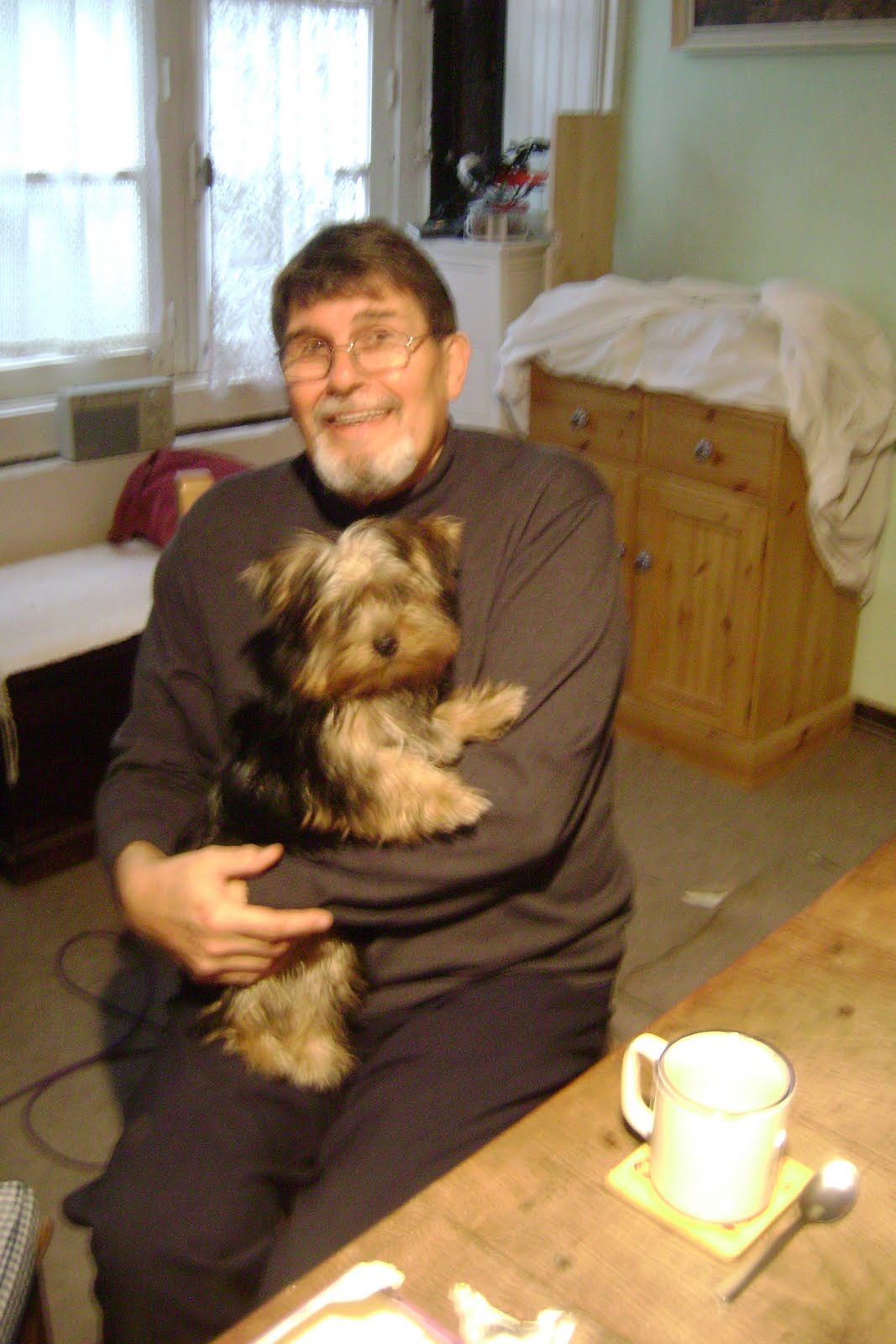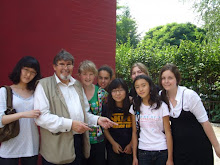Although I love Einstein dearly - he is such a tatterdemalion! -and there have been other dogs in my life: Molly, the Red Setter

(s0meone once said of the breed, "100% heart and 0% brain), Smirnoff, who travelled from Switzerland to Essex to Central Africa, and Portia, a cross breed Spaniel; the one which runs most boisterously through my dreams is Yoschi
The name in English is translated as Little Joseph. His real name was much grander as befitted a pedigree: Yoshi de la Planete.
He was a gift from my students, one long ago November. The idea that a dog would be the perfect birthday present came from Charlie Bethell who in those days was a cheerful tow-haired boy with a grin from ear to ear. He told members of staff of his idea, all of whom advised him against such a move. He was undaunted. He went to see the headmaster. That wise man looked at him steadily for a moment; then said, "Well, if you are really determined, you had better make sure that it is a very good dog."
And so Yoschi was. I was inveigled into the Grand'Salle, the central area of the school, to be greeted by cheers and singing and Charlie moving forward towards me.I looked down into his arms.There lay the tiny tan form of a boxer puppy. He gazed up at me with melting dark eyes, quite unfazed by the hubub around him.
But nothing ever fazed Yoschi. The school was his world. Each morning, when I went off to wake up the senior boys in the boarding house. I would let him out into the park. I never saw him for the next three hours. He made his tour of his school. First - and this, I am sure, was because he was Swiss and understood etiquette - he would pop into the head's office to say "Bonjour"; then, (persumably because he was not simply Swiss but Suisse Romande and therefore aware of French manners), he would go to the secretariat and greet the ladies there whom, he knew, really appreciated his charm. Then, the overture over, he would trot round to the kitchens where the chef would serve him breakfast. By now, of course, the school was in lessons, and he would check out the grounds before returning to the central courtyard with its red squirrels, its fountain and the tree where the post used to be given out to the students. My classroom was there with its great tall french windows. He would find it, see me teaching, leap though the open window and curl up for a doze beneath my desk. When he got bored with the lesson, he would get to his feet, stretch with an enormous yawn, move to the door, open it and leave. The students recognised a braver spirit than theirs in his comment.
We went to Gstaad in Winter, and I remember his delight of the snow. He would spy a laden meadow and leap into it, disappearing below the white surface. Then he would suddenly appear out of the snow in an arc of joy, barking, before submerging, only to reappear in another gigantic leap a hundred yards away.
He was not without intelligence. He knew who everyone was in the school and where they stood in the heirarchy. He had only to watch an event once and he knew what to do. That is how he learned how to deal with doors.
But there was one mystery I never solved.
It was during his first days in Gstaad. For the first time I took him down the little path that led to the main street and along to the station hotel which we entered and took the lift up to the apartment of a friend on the top floor. There were students from school there and when it came time for them to return to school, my friend asked me if I would stay for supper with her. Since I was free , I accepted and asked one of the students to take Yoschi back to the room I had in one of the school chalets and feed him before going down to the main building for supper. The boy departed with Yoschi. I know that the two of them went down to the ground floor in the hotel lift. I know that they travelled by car from the station to the school.
So, how was Yoschi able to be barking outside the apartment door of my friend half an hour later, determined not to miss out on my evening? How did he follow a route he had only taken once? And how did he get from the ground floor of the hotel to the fifth floor where my friend had her apartment? I have visions of him standing up on his back paws and pushing the lift buttons; or, perhaps he made sympathetic contact with a fellow guest: he would have instinctively known with which stranger he shoud bond.
I only saw him discomfitted once. I had been shopping and , after putting away most of my purchases, left to go down to the main building of the school to do some work. When I returned, I opened the door to find Yoschi, vainly trying to sink into the back of the settee as if he could be invisible. His face, his paws, the settee and the room were covered in flour - far more than could ever have been in the original packet, it seemed. Yoschi had on his face a look of complete amazement and tried, without success, to give me a look that pleaded innocence.
He never did it again.
He was a dog of life and love, who knew his place (the very middle of my bed) and understood people. He loved the school and the school loved him.
He had a massive heart attack and died in Gstaad.
I wept.
 Despite the fact that I have twenty or so cookery books with such diverse titles as "Italian Cooking", "Cooking the French Way", "Grandma's Little Recipe Book", "The Woman's Institute Book of Recipes", Delia Smith's How to Cook , Part Two", "The Malawian CookBook", "1000 Recipes", "Miracle Foods" and even "Winnie the Pooh's Cook Book", I hate cooking. To spend hours skinning and peeling , chopping and mincing, flavouring, savouring, basting, tasting, dicing and slicing and spicing ; all for an end product that will be swallowed in less than ten minutes, seems a pretty pointless occupation.
Despite the fact that I have twenty or so cookery books with such diverse titles as "Italian Cooking", "Cooking the French Way", "Grandma's Little Recipe Book", "The Woman's Institute Book of Recipes", Delia Smith's How to Cook , Part Two", "The Malawian CookBook", "1000 Recipes", "Miracle Foods" and even "Winnie the Pooh's Cook Book", I hate cooking. To spend hours skinning and peeling , chopping and mincing, flavouring, savouring, basting, tasting, dicing and slicing and spicing ; all for an end product that will be swallowed in less than ten minutes, seems a pretty pointless occupation.


